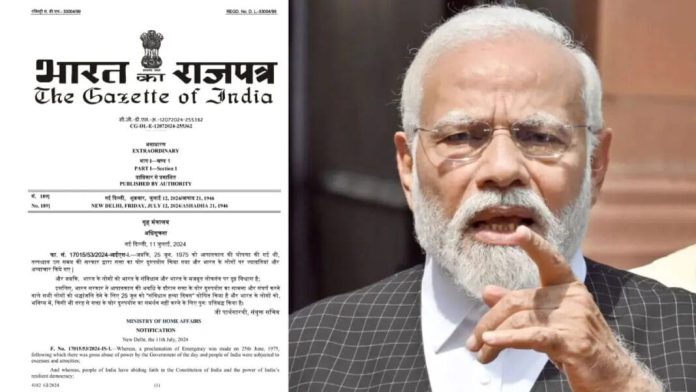July 13, 2024
New Delhi—The NDA government has declared June 25 as “Samvidhan Hatya Diwas” (Constitution Assassination Day) to commemorate the day in 1975 when former Prime Minister Indira Gandhi imposed the Emergency, suspending fundamental rights and press freedom. This period, which lasted 21 months, is often viewed as a dark chapter in India’s history.
The Home Ministry’s notification, issued on July 11, describes the Emergency as a period of “gross abuse of power” and aims to honor those who resisted it. Prime Minister Narendra Modi and Home Minister Amit Shah have both made strong statements on social media condemning the Emergency and its impacts on democracy.
Modi stated that the observance would remind the nation of the dangers of constitutional violations, while Shah accused Indira Gandhi of strangling democracy. These statements are seen by some as part of a broader campaign to discredit the Gandhi family, particularly Rahul Gandhi, who has been a vocal critic of the BJP.
Rahul Gandhi has emphasized the threat to the Constitution under the BJP, promising its protection. His leadership in the Lok Sabha and his public speeches have bolstered his reputation, contrasting with the BJP’s portrayal of his family’s past.
Critics argue that while the Emergency suspended the Constitution for 21 months, the BJP has undermined constitutional values continuously since coming to power in 2014. They point to increased instances of mob lynchings, attacks on minority communities, and the suppression of media as evidence of ongoing constitutional violations.
Data from India Spend highlights that 97% of cow-related mob attacks have occurred since 2014, predominantly targeting Muslims. The Ministry of Home Affairs reported 45 deaths in mob lynchings from 2014 to early 2018. Similarly, the Catholic Social Service Society documented 109 mob lynchings between January 2014 and July 2018.
The government has also been accused of using central agencies to target opposition leaders and suppress dissent, actions reminiscent of authoritarian rule rather than democratic governance. The treatment of journalists critical of the government further echoes the media suppression seen during the Emergency.
Despite the BJP’s condemnation of the Emergency, critics argue that the party’s actions in power have similarly compromised India’s democratic principles and constitutional integrity. The upcoming assembly elections in Haryana, Jharkhand, and Maharashtra will test whether the BJP’s narrative against the Gandhi family influences voters.
The ongoing debate underscores the complexities of India’s political landscape, where historical events are often invoked to shape contemporary political strategies.




